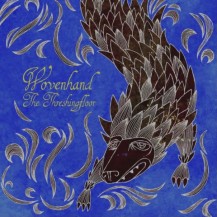Wovenhand’s “The Threshingfloor”
It’s no secret that Wovenhand’s latest is one of Holly’s favorites. Check out what she has to say about it.
Holly Etchison
9.6
out of 10
The Threshingfloor
June 21, 2010
Travelling into the world of Wovenhand is a singular experience. There is something that should be known from the outset: David Eugene Edwards ain’t foolin’, ya’ll. Gathering musical credibility as the front man for 16 Horsepower, Edwards has gone on to form Wovenhand, a group who seems to grow more intensely definitive with each release. Their latest album The Threshingfloor, a rare combination of traditional European folk instrumentation, bluesy rock and roll, and searing lyricism, exceeds expectations for fans and I believe will set a unique precedence for first time listeners.
In a layered sense, this recording finds Edwards looking to the hills from which he was hewn. A great atmospheric presence permeates the songs, combining physical and spiritual terrains; his sojourn in these regions is felt and heard by the listener. The songs reflect an interest in native origins, borrowing words and sounds from ancient text and instruments, from the nomadic Hebrews to the wandering Romanian gypsy to the first nations people of America. Conceptually, “the threshing floor” most likely refers to a place of preparing grain after a harvest in biblical times. This was done by flailing the sheaves with a rod or by trampling them under oxen’s feet on a hard surface. In the old testament, King David is instructed by God to purchase a threshing floor from a farmer. It was this humble area of destruction upon which Solomon later built the elaborate temple.
The title track sets the stage in a somewhat spectacular way. You imagine brightly colored scarves waving in the air under the cover of a tent of stars, women with timbrels and castanets dancing around a fire, somebody in the corner with a sitar. A stern voice plainly proclaims: “Every secret sin/ On and of this earth/ Grows fierce from the ground/ Instruments with teeth/ Instruments with teeth/ Cut them down,” and then a foreign chant is sung, “Bara devlam/ Devlam bara/ Devlam bara/ Istenem, which research told me comes from the Lovari Romani language and means “mighty God.”
A sense of tribal belonging also arises from the core in tracks like “A Holy Measure” with its steady drumbeat threaded together by a Hungarian shepherd’s flute. It is hard to refrain from keeping step as the lyrics illuminate the presence of a tall shepherd, and counsel to “Beat the drum for him/ A holy measure… By him/ For him/ Through him, Everything (and everybody, apparently, by the song’s end) all.”
Dark and brooding, “Raise Her Hands” has us slowly marching towards something, maybe a ritualistic ceremony or a sweatin‘ it out with Jesus lodge, and is tinged with bluesy guitar. We are relieved to hear the line “Blessed is the man/ Against whom the Lord counts not his wrongs.” As an affirmation, gently we are moved from this place to “His Rest,” one of the loveliest tunes in the collection. Dreamlike lines describe a woman sharing a type of harvest: “She whispers as an aspen tree/ In her windy, windy way/ Bringing fruit and flowers to me/ Placed in vessels of clay.”
“Singing Grass,” eerie and hypnotic, is, I believe, a warning against an original angel of song, fallen and bent on evil, similar in nature to “The Man In The Long Black Coat” on Dylan’s Oh Mercy album. Here we are told more plainly:
“The Beast/ He plays his harp/ He does deceive the hearts/ False fires in the minds of men/ This his wind/ Sways the grass to dance/ To dance before him.” The song itself weaves a trance-like spell illuminating its theme.
The fast paced “Terre Haute” snaps things back into focus as another outstanding track on the album. Warriors arise from an old battlefield, a melodious flute fills the airspace; Edwards takes a ghostly moment to announce: “It is his spirit/ It is his fruit/ It is he who paints by numbers… You regard him not risen.”
Slowly, “Orchard Gate” reassures as a type of mystical love song, singing, “In this way my love/ Whispers to me/ Warm, beloved, and still/ In this way my love/ Come to me… She is turning/ Turning in… She is turning into gold.” We are left at another firelit dance, drums pick up the pace, and the exultation is felt as Edwards chants “la-la-la-la-la-la-looo” and a cymbal brings the action to a halt. We collapse, bowed on the ground.
Tying a credible musical thread from the past to the present, David Edwards brings the concept of a threshing floor from its ancient implications to modern use. As well as being a collection of captivating songs, The Threshingfloor could also be considered a strange type of sacred musical history experience (with some rockabilly moments), one that has great significance for the times in which we live. We alongside him become the threshing instruments, the winnowers on the basest of grounds, and our bodies become a temple, partaking of a perpetual harvest that is here and now, and offering it back in worship. An act of singing or stamping to the beat, of allowing the verses to enter our understanding, the words sharp as the two edged sword of scripture. A place from where, gathered in all our diversity, leveled as one, comes the building of a kingdom. Beautiful.
